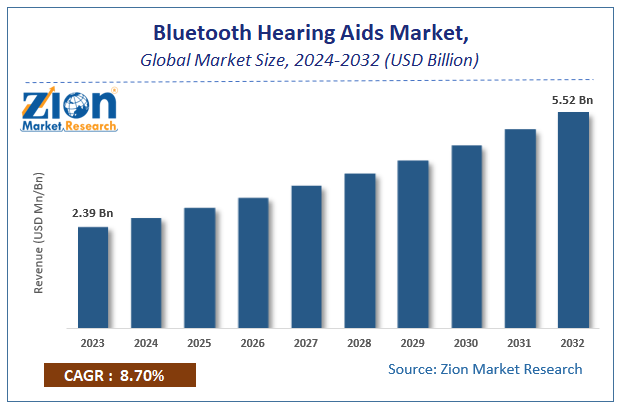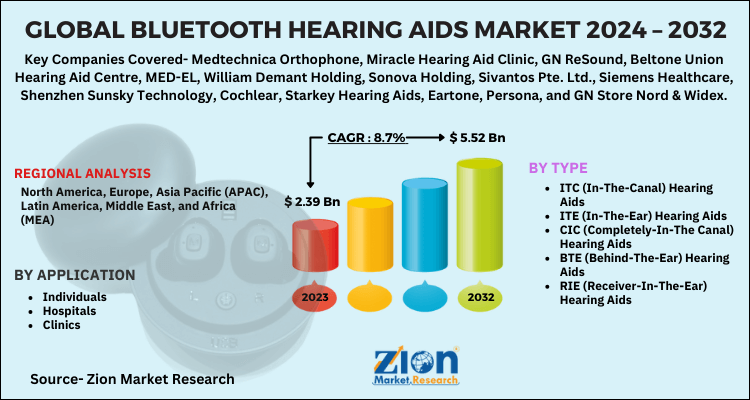Bluetooth Hearing Aids Market Size, Share, Analysis, Trends, Growth, Forecasts, 2032

Bluetooth Hearing Aids Market - By Type (In-The-Ear Hearing Aids, In-The-Canal Hearing Aids, Completely-In-The Canal Hearing Aids, Behind-The-Ear Hearing Aids, and Receiver-In-The-Ear Hearing Aids), By Applications (Clinics, Hospitals, and Individuals), And By Region - Global Industry Perspective, Comprehensive Analysis, and Forecast, 2024 - 2032-
| Market Size in 2023 | Market Forecast in 2032 | CAGR (in %) | Base Year |
|---|---|---|---|
| USD 2.39 Billion | USD 5.52 Billion | 8.7% | 2023 |
Bluetooth Hearing Aids Market: Industry Prospective
The global Bluetooth Hearing Aids Market value was estimated at 2.39 Billion in 2023 and is projected to register a CAGR of nearly 8.7% during the period from 2024 to 2032. Apparently, the market is likely to accrue revenue worth about 5.52 Billion by 2032. The report offers valuation and analysis of the Bluetooth Hearing Aids Market on a global as well as regional level. The study offers a comprehensive assessment of the industry competition, restraints, revenue estimates, avenues, current & emerging trends, and industry-validated market information. The report offers historical data from 2018 to 2022 along with a forecast from 2024 to 2032 based on value (USD Billion).
Bluetooth Hearing Aids Market: Overview
Bluetooth hearing aid is an instrument that assists individuals with hearing problem to hear the sound in a clear tone. Moreover, the device assists the person in participating in daily conversations in a more effective way. The product comprises three key components, namely, microphone, speaker, and amplifier. Bluetooth hearing equipment gets the sound via microphone and transforms it into electric signal. After that, it sends the signal to amplifier which enhances the electric signal power and transmits it to ear via speakers. Moreover, the product is used by an individual having hearing debility.
Bluetooth Hearing Aids Market: Report Scope
| Report Attributes | Report Details |
|---|---|
| Report Name | Bluetooth Hearing Aids Market |
| Market Size in 2023 | USD 2.39 Billion |
| Market Forecast in 2032 | USD 5.52 Billion |
| Growth Rate | CAGR of 8.7% |
| Number of Pages | 110 |
| Key Companies Covered | Medtechnica Orthophone, Miracle Hearing Aid Clinic, GN ReSound, Beltone Union Hearing Aid Centre, MED-EL, William Demant Holding, Sonova Holding, Sivantos Pte. Ltd., Siemens Healthcare, Shenzhen Sunsky Technology, Cochlear, Starkey Hearing Aids, Eartone, Persona, and GN Store Nord & Widex. |
| Segments Covered | By Type,By end-user, and By Region |
| Regions Covered | North America, Europe, Asia Pacific (APAC), Latin America, Middle East, and Africa (MEA) |
| Base Year | 2023 |
| Historical Year | 2018 to 2022 |
| Forecast Year | 2024 - 2032 |
| Customization Scope | Avail customized purchase options to meet your exact research needs. Request For Customization |
Bluetooth Hearing Aids Market: Growth Dynamics
Surge in the number of hearing disorders witnessed in the aging population has led to massive demand for Bluetooth hearing aids. In addition to this, rise in the occurrence of hearing impairment has resulted in massive use of the product, thereby driving the market trends. Growing requirement for enhancing streaming experience of an individual through Bluetooth hearing aids along with need for personalizing seamless hearing experience will boost the expansion of Bluetooth hearing aids industry over the forecasting years.
Furthermore, need for remotely controlling hearing aids equipment and need for maintaining standard protocols in clinics will steer the business growth over the years ahead. Nonetheless, low battery lifespan, uncomfortable buzzing, and amplification will impede the expansion of the Bluetooth hearing aids industry over the ensuing years.
The Bluetooth Hearing Aids Market is experiencing significant growth due to several key factors that are transforming the hearing aid industry. These growth drivers include:
1. Technological Advancements
-
The integration of Bluetooth technology in hearing aids has revolutionized the market by allowing users to connect directly to smartphones, TVs, and other devices. This offers enhanced sound quality and user experience, such as streaming music, phone calls, and media directly into the hearing aids.
-
Advanced features like noise reduction, directional microphones, and AI-driven sound adjustment are improving the functionality and appeal of Bluetooth hearing aids.
2. Rising Prevalence of Hearing Loss
-
With the global aging population, there is an increasing number of individuals suffering from age-related hearing loss. Bluetooth hearing aids cater to this growing demographic by offering both hearing assistance and connectivity to modern devices.
-
Noise-induced hearing loss is also on the rise due to environmental factors, driving the demand for advanced hearing solutions.
3. Increased Awareness and Acceptance
-
There has been a shift in consumer attitudes toward hearing aids. People are now more open to using technologically advanced hearing aids that offer seamless integration with everyday devices.
-
Campaigns and efforts by healthcare organizations to raise awareness about hearing health and available solutions are increasing demand.
4. Comfort and Discreet Design
-
Modern Bluetooth hearing aids are designed to be lightweight, comfortable, and discreet, making them more appealing to users who may have been hesitant about traditional hearing aids.
-
Innovations in design, such as invisible in-ear models, enhance user comfort and satisfaction.
5. Government Initiatives and Reimbursement Policies
-
In many countries, governments are introducing favorable healthcare policies and reimbursement options for hearing aids, which are making advanced technologies like Bluetooth hearing aids more accessible to patients.
-
Public healthcare programs in regions like North America and Europe provide financial support to patients in need of hearing aids.
6. Growing Adoption of Wireless Devices
-
As consumers increasingly adopt wireless devices in their daily lives, the demand for Bluetooth-enabled hearing aids is rising. These devices offer greater convenience by integrating hearing assistance with everyday activities.
-
The expanding market of connected healthcare and the Internet of Things (IoT) is also pushing the adoption of Bluetooth hearing aids.
7. Increasing Product Customization
-
Manufacturers are offering personalized hearing aid solutions based on individual hearing needs, which appeals to a broader audience and helps enhance user satisfaction.
-
Customization of sound profiles and fit, through digital apps, adds value to Bluetooth hearing aids, making them more adaptable to different environments and user preferences.
These growth factors collectively contribute to the increasing adoption and expansion of the Bluetooth Hearing Aids Market across the globe.
Bluetooth Hearing Aids Market: Segmentation
The global Bluetooth hearing aids market is bifurcated on the basis of type, application, and regional analysis.
Based on the type, the market is divided into ITE (in-the-ear) hearing aids, ITC (in-the-canal) hearing aids, CIC (completely-in-the-canal) hearing aids, BTE (behind-the-ear) hearing aids, and RIE (receiver-in-the-ear) hearing aids.
Based on the applications, the market is divided into clinics, hospitals, and individuals.
Based on geographical analysis, the global Bluetooth hearing aids market is divided into North America, Europe, Latin America, Asia Pacific, and Middle East & Africa.
Bluetooth Hearing Aids Market: Regional Insights
Asia Pacific Market To Register Highest Growth Rate Over 2024 – 2032
The expansion of the industry in the Asia Pacific zone over the assessment timeline is owing to high proportion of noise pollution in countries such as Japan, India, and China. In addition to this, rise in the per capita income and spending on healthcare sector to improve the infrastructure across the zone will promote the expansion of Bluetooth hearing aids industry over the forthcoming years. In addition to this, favorable government schemes aiding the product development is anticipated to boost the regional market trends.
Bluetooth Hearing Aids Market: Competitive Space
Key players profiled in the report include
- Medtechnica Orthophone
- Miracle Hearing Aid Clinic
- GN ReSound
- Beltone Union Hearing Aid Centre
- MED-EL
- William Demant Holding
- Sonova Holding
- Sivantos Pte. Ltd.
- Siemens Healthcare
- Shenzhen Sunsky Technology
- Cochlear
- Starkey Hearing Aids
- Eartone
- Persona
- GN Store Nord & Widex.
The global Bluetooth hearing aids market is segmented as follows:
By Type:
- ITC (In-The-Canal) Hearing Aids
- ITE (In-The-Ear) Hearing Aids
- CIC (Completely-In-The Canal) Hearing Aids
- BTE (Behind-The-Ear) Hearing Aids
- RIE (Receiver-In-The-Ear) Hearing Aids
By Applications:
- Individuals
- Hospitals
- Clinics
By Region
- North America
- The U.S.
- Canada
- Europe
- France
- The UK
- Spain
- Germany
- Italy
- Rest of Europe
- Asia Pacific
- China
- Japan
- India
- South Korea
- Southeast Asia
- Rest of Asia Pacific
- Latin America
- Brazil
- Mexico
- Rest of Latin America
- Middle East & Africa
- GCC
- South Africa
- Rest of Middle East & Africa
Table Of Content
Methodology
FrequentlyAsked Questions
Surge in the number of hearing disorders witnessed in the aging population has led to massive demand for Bluetooth hearing aids. In addition to this, surge in the occurrence of hearing impairment has resulted in massive use of the product, thereby driving the market trends.
According to Zion market research, the The global Bluetooth Hearing Aids Market value was estimated at 2.39 Billion in 2023 and is projected to register a CAGR of nearly 8.7% during the period from 2024 to 2032. Apparently, the market is likely to accrue revenue worth about 5.52 Billion by 2032.
Asia Pacific is likely to make noteworthy contributions towards overall market revenue during 2024 – 2032. The surge in the expansion of market in the sub-continent over the estimated timespan is due to high proportion of noise pollution in countries such as Japan, India, and China.
The key players profiled in the report include Medtechnica Orthophone, Miracle Hearing Aid Clinic, GN ReSound, Beltone Union Hearing Aid Centre, MED-EL, William Demant Holding, Sonova Holding, Sivantos Pte. Ltd., Siemens Healthcare, Shenzhen Sunsky Technology, Cochlear, Starkey Hearing Aids, Eartone, Persona, and GN Store Nord & Widex. New product innovations and expansion of the product portfolio will further contribute towards the market revenue over the years ahead.
RelatedNews
HappyClients
Zion Market Research
Tel: +1 (302) 444-0166
USA/Canada Toll Free No.+1 (855) 465-4651
3rd Floor,
Mrunal Paradise, Opp Maharaja Hotel,
Pimple Gurav, Pune 411061,
Maharashtra, India
Phone No +91 7768 006 007, +91 7768 006 008
US OFFICE NO +1 (302) 444-0166
US/CAN TOLL FREE +1 (855) 465-4651
Email: sales@zionmarketresearch.com
We have secured system to process your transaction.
Our support available to help you 24 hours a day, five days a week.
Monday - Friday: 9AM - 6PM
Saturday - Sunday: Closed







